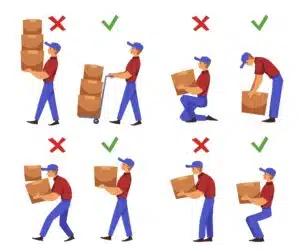This guide aims to answer some frequently asked questions (FAQs) about making a manual handling injury compensation claim. We start by explaining what manual handling is and when you may be eligible to make a claim if you have suffered an injury in an accident at work.
Following this, we will discuss the time limit within which all personal injury claims must be started. We will then provide some guidance on how manual handling injuries could be prevented in the workplace. Additionally, you may also be wondering how long a manual handling injury claim takes to settle. We also aim to answer this question within this guide.
This guide will also look at how compensation is calculated for successful manual handling claim, and how a No Win No Fee solicitor from our panel could help you claim compensation for your injuries and the financial losses they have caused you.
If, after finishing this guide, you still have any questions that have not been answered, you can contact our team of advisors. As well as answering your questions, they can offer you free advice for your potential manual handling compensation claim. Connect with our team today via one of the following methods:
- Call 0113 460 1215
- Speak to our team using the live chat feature.
- Complete the contact form to request a call-back.
Browse Our Guide
- What Is Manual Handling?
- When Can You Make A Manual Handling Injury Compensation Claim?
- Is There A Manual Handling Accident Claim Time Limit?
- How Can Manual Handling Injuries Be Prevented When Working?
- How Long Will A Manual Handling Injury Compensation Claim Take?
- What Amount Of Compensation Could You Receive From A Manual Handling Accident?
- Why Make A Claim On A No Win No Fee Basis?
- More Information About Making Manual Handling Claims
What Is Manual Handling?
The Health and Safety Executive (HSE) are Britain’s regulatory body for workplace health and safety, They define manual handling as an act that requires bodily force to lift, push, pull or carry objects at work. Numerous industries rely upon manual handling to complete their tasks, such as:
- Manufacturing and warehousing.
- Construction and building sites.
- Plant processing.
- Nursing and Healthcare
- Retail.
In the next section, we discuss when you could be eligible to make a manual handling injury compensation claim if you suffered this particular type of injury in a workplace accident. You can also contact our advisors for free advice.
When Can You Make A Manual Handling Injury Compensation Claim?
Your employer owes a duty of care to you under the Health and Safety at Work etc. Act 1974 (HASAWA). It states that employers are responsible for taking reasonable and practicable precautions in their workplaces to help ensure their employees’ health and safety. This could include providing employees with adequate manual handling training and performing regular risk assessments.
Additionally, the Manual Handling Operations Regulations 1992 provides guidance to employers on assessing, avoiding and reducing the risk of injury from manual handling.
To be eligible to make an accident at work claim, you will need to prove:
- A duty of care was owed to you by your employer.
- This duty was breached by your employer.
- You sustained an injury as a result of this breach.
Some examples of how manual handling accidents could occur include:
- When an employer asks one person to carry a load that needs to be carried by at least two people. This can result in the employee suffering hand injury or wrist fractures.
- Failing to provide an employee with any manual handling training before assigning manual handling tasks to them. This could result in the employee suffering a back injury due to improper lifting techniques.
What Are Common Injuries Caused By Manual Handling?
Some examples of common manual handling injuries that could be suffered in the workplace include:
- Sprains and strains.
- Back and spinal injuries.
- Ligament tears to the hands, back and knee.
- Fractures and broken bones in the foot and wrist, for example.
- A hernia (protrusions caused by the strain of a task).
If you have suffered any of these injuries in a workplace accident, and would like to know whether you could be eligible to make a manual handling injury compensation claim, you can contact a member of our advisory team.
Is There A Manual Handling Accident Claim Time Limit?
Under the Limitation Act 1980, there is a three-year time limit for starting a personal injury claim. This runs from the date the accident that injured you took place. However, certain exceptions can be made to this time limit.
For example, if the claimant is under the age of 18, they cannot start a claim themselves. The courts may appoint a litigation friend to begin this process on their behalf prior to their 18th birthday. If no claim is submitted for them, the claimant has three years, starting from the date of their 18th birthday, to begin their own legal proceedings.
Those who lack the mental capacity to claim for themselves will have the three-year time limit frozen. It will only be reinstated if the claimant were to regain this mental capability, and would then run from this recovery date. A litigation friend may act on their behalf during any time that the time limit is frozen.
If you have any questions regarding the personal injury claim time limits, you can contact our advisors. They can also provide you with free advice for your potential manual handling injury compensation claim.
How Can Manual Handling Injuries Be Prevented When Working?
There are various ways that manual handling injuries could be suffered within the workplace. The HSE advises employers to avoid any manual handling tasks that can be. This can be done by redesigning the task to avoid having to move the load. Alternatively, the process could be automated or mechanised.
Any manual handling tasks that cannot be avoided should be risk assessed. Some factors that should be taken into consideration when this risk assessment is being performed include:
- The worker’s fitness, strength and if they have any underlying medical conditions.
- How far the load is being lowered, carried and lifted.
- The working environment – e.g. is there suitable lighting and flooring.
- The weight and nature of the load, e.g. is it slippery or sharp.
There are also certain steps your employer could take to help minimise the risk of injury for manual handling. These include:
- Modifying the workplace to reduce carrying distances and twisting distances.
- Ensuring the person completing the task has received sufficient training on how to perform is safely.
- Making loads smaller and lighter, also breaking down larger cosignments.
- Improving the work environment to ensure there is suitable flooring and enough lighting.
If you have any questions regarding manual handling accident claims, you can contact a member of our advisory team today.
How Long Will A Manual Handling Injury Compensation Claim Take?
There is no set time frame for how long a manual handling injury compensation claim will take to settle. Various factors will affect the time progress of a claim, such as:
- The extent of your injuries.
- How long your injuries will take to recover.
- Whether your employer accepts or denies responsibility.
- How long it takes to gather evidence to support your case.
If you instruct a solicitor, they can help guide you through the manual handling claims process. To see whether a solicitor from our panel could assist you with your case, you can contact one of our advisors.
What Amount Of Compensation Could You Receive From A Manual Handling Accident?
A compensation settlement for a successful manual handling injury compensation claim could include both general and special damages.
General damages are awarded to all successful claimants, as they compensate you for the physical and mental injuries suffered.
Those calculating this head of your claim may refer to the compensation guidelines listed within the Judicial College Guidelines (JCG). This document lists compensation guideline brackets for a range of injuries.
We have used some of these guidelines when creating the following table, aside from the top entry. Please only use this table as a guide, as how much compensation you could receive will depend on the specific factors of your case.
Compensation Guidelines
| Area of Injury | Severity | Award Bracket Guidelines | Notes |
|---|---|---|---|
| Multiple Severe Injuries Plus Special Damages | Severe | Up to £500,000+ | Cases of multiple severe injuries with the associated special damages award for lost earnings, care costs and medical bills. |
| Knee | (a) Severe (i) | £85,100 to £117,410 | Serious joint disruption and gross ligament damage that causes considerable pain and lost function as well as the need for lengthy treatment. |
| Hands | (b) Serious Damage to Both Hands | £68,070 to £103,200 | Injuries that give rise to permanent cosmetic disability and significant lost function. |
| (f) Severe Fractures to Fingers | Up to £44,840 | Cases that may lead to partial amputations and caused impaired grip, deformity, loss of mechanical function and sensation disturbances. | |
| Wrist | (a) Complete Loss of Function | £58,100 to £73,050 | Cases where the wrist has lost function totally, such as when an arthrodesis has been performed. |
| Arm | (b) Injuries Resulting in Substantial and Permanent Disablement | £47,810 to £73,050 | Serious fractures that impact one or both forearms leaving a permanent residual disability that is either cosmetic or functional |
| Back | (a) Severe (iii) | £47,320 to £85,100 | Fractures, disc lesions and soft tissue injuries that despite treatment, give rise to chronic disability and pain. |
| Ankle | (c) Moderate | £16,770 to £32,450 | Ligament tears and fractures that cause difficulties walking, standing or taking stairs. |
| Foot | (f) Moderate | £16,770 to £30,500 | Displaced metatarsal fractures that leave permanent deformity and long-term risk of osteoarthritis and/or surgery in the future. |
| Shoulder | (b) Serious | £15,580 to £23,430 | Dislocation and brachial plexus damage leading to sensory problems, pain, aching and weakened grip. |
| Elbow | (c) Moderate or Minor | Up to £15,370 | Cases of simple fracture, lacerations or tennis elbow syndrome causing no permanent damage or impaired function. |
What Financial Losses Could You Claim For?
Special damages compensate the claimant for financial harm and expenses caused by the injuries suffered. Some examples of what could be claimed under special damages include:
- Travel expenses to GP or hospital appointments.
- A loss of earnings due to needing to take time off work.
- The cost of at-home care.
- The costs of prescriptions.
You will need to have documented proof of your financial losses in order to claim for them under special damages. This could include wage slips, invoices and receipts.
For a free valuation of your potential manual handling injury compensation claim, you can contact our team of advisors.
Why Make A Claim On A No Win No Fee Basis?
The solicitors on our panel are able to offer their expert services through a type of No Win No Fee agreement, called a Conditional Fee Agreement (CFA), provided that you have a valid claim.
With this particular arrangement in place, you will not need to pay anything upfront for them to begin working on your manual handling injury compensation claim. Additionally, no service fees will need to be paid while the claim is progressing or if it fails.
A successful outcome will require you to pay a success fee to your solicitor. This will be taken from your compensation. However, the law limits the percentage solicitors can take as this fee.
To see whether one of the No Win No Fee solicitors on our panel could help you, you can contact our advisors. They can also answer any additional questions you may still have about manual handling compensation claims. To connect with our team today, you can:
- Call 0113 460 1215
- Use our live chat pop-up to ask a question.
- Complete the contact form to request a call-back.
More Information About Making Manual Handling Claims
You may find these additional guides from our website helpful:
- This guide discusses further when you can make manual handling injury claims.
- Read about accident at work compensation in this guide.
- Also, some information on claiming for an injury after a slip, trip or fall accident.
Further external resources:
- Here is the HSE’s brief guide on Manual Handling in the workplace.
- This resource looks at musculoskeletal injuries from the NHS.
- Advice on seeking Statutory Sick Pay (SSP) from Gov.UK
We hope you’ve found our guide on FAQs for making a manual handling injury compensation claim useful. If you have any additional questions that have not been answered within this guide, you can contact a member of our advisory team.





